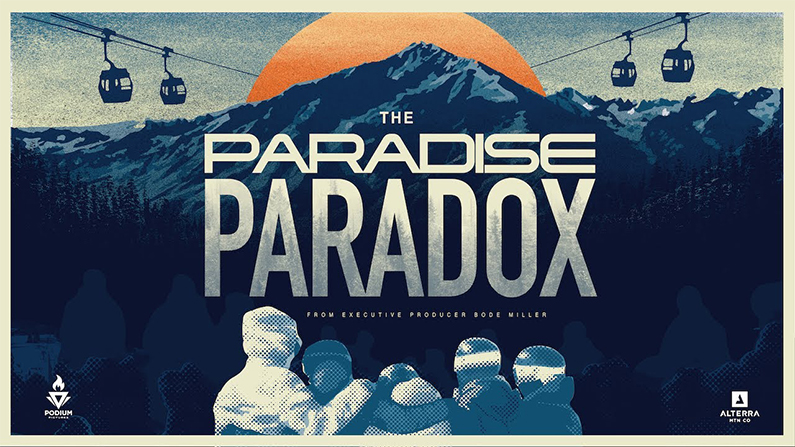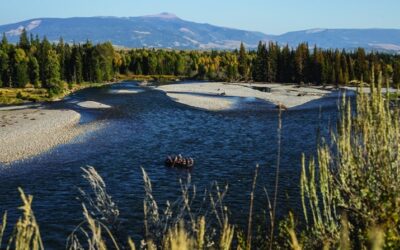A new documentary “The Paradise Paradox” explores the mental health crisis in America’s mountain towns. The film will screen at 5:15 p.m. on Monday, May 13 at The Virginian Lodge, followed by a panel discussion with local leaders including, Laurie Andrews from the Jackson Hole Community Foundation, Sarah Cavallaro from Teton County Youth and Family Services, Ashley Diedre from Mental Health & Recovery Services of Jackson Hole, Sheriff Matt Carr, and Dr. Jeff Greenbaum from St. John’s Health.
KHOL film critic Jeff Counts talked with filmmaker Brett Rapkin about how he approached making a film about such a heavy subject.
Jeff Counts/KHOL: Brett Rapkin, welcome to On Set.
Brett Rapkin: Thanks. Glad to be here.
Counts: I’ve been living and working in mountain towns for 20 years and I have to admit, I was unaware of the mental health and suicide realities you confront in “The Paradise Paradox.” How did you learn about this problem?
Rapkin: Yeah, really, just reading in the media, starting to learn about some of the statistics and felt like it was a particular demographic that was worth shining a light on.
Counts: Places like Vail and Jackson can seem like unbreachable fortresses of wealth and privilege for people who don’t ever spend any time in them, and because of that they are perhaps hard communities to feel sympathy for. Is one of the messages of “The Paradise Paradox” that these issues are truly universal?
Rapkin: Yeah, absolutely. I mean, mental health challenges transcend race, color, creed, wealth. They affect all of us. It’s universal. And that’s our mission at Podium is to continue to break down the stigma around the issue.
Counts: There is a lot of tragedy to cope with in your film, but the overall tone is optimistic. Was that always the goal, or did the people you met and interviewed make that the obvious choice?
Rapkin: That was always the goal. I mean, from the very beginning, you know, I sat down with my friend Bode Miller, the legendary ski racer who I met in 2004 when I was hired to spend the winter traveling the World Cup tour in Europe with him in the US ski team, and brought this issue to his attention, or the concept for a film. And he had in recent years moved his family to Big Sky, Montana. So he’s been living in the mountains. And from the beginning, we wanted to make something solution-oriented and positive. To harp on the tragedy and the negative, the dark side of it would be a missed opportunity and amateurish and that’s not what we were looking to do.
Counts: One of the things I find interesting about ski resort films is the b-roll. It can be so easy to make everything look like a tourism ad, and that rarely works with serious content. What are you thinking about when you choose the shots that stitch together interview segments?
Rapkin: That’s a great question. I mean, it’s almost like all our lives now are, you know, a ski video or a tourism video with Instagram and social media. You know, most people are only putting out the highlights of going out to the Italian restaurant and having the beautiful plate of pasta. But as we all know, life is not eating the delicious meal all day long. Everybody’s life is full of hopefully incredible joy, but also serious challenges, some more serious than others. So, you know, I think we wanted to, with the cinematography, portray the beauty of the mountains and these incredible resorts and communities, but also it needed to be done in contrast with the story itself.
Counts: What do you hope the audience in Jackson will take away from this experience. “The Paradise Paradox” is not about us, specifically, but should we recognize ourselves in these stories?
Rapkin: Well, if you’re human, which we all are, then you should recognize yourself in the stories of other people who are dealing with challenges. I mean, I don’t know anybody who every day is easy for. We hope that the community will utilize the discussion guide that we’ve created to talk about the issue at large and also have an honest conversation about what exists and what doesn’t in Jackson. You’ll see in the film what they’re doing in places like Vail to address the issue. And we hope that at least one good idea will come out of the room that can be put into place.
Counts: Are there specific resources that you would like our listeners to know about related to mental health and suicide prevention?
Rapkin: If you’re dealing with, a critical issue, if you’re feeling suicidal or somebody who’s who’s struggling, there’s resources like 311 that you can immediately contact. But we hope that when you guys [Jackson residents] watch the film and as you talk about it, you really shine a light on the community and do an honest assessment of what exists in Jackson currently around these issues. I think when you see the film, you’ll see again what exists in Vail, and there’s no reason with the wealth and the resources and the amazing people that are in Jackson that your community can’t create something just as great.
Counts: Tell our Jackson Hole listeners how they can see the film and where they can learn more about it.
Rapkin: If you’re not able to make it to the upcoming event, the film is available on Amazon Prime Video. We made it as inexpensive as possible—I think it’s $0.99. And then also if you want to watch it for free, it’s available on Outside Watch.
Counts: Brett Rapkin, thank you for joining me today On Set.
Rapkin: Thank you.
MENTAL HEALTH RESOURCES
If you’re in emotional distress or crisis, text or call 988 for free, 24/7 confidential support.
For additional resources on navigating mental health, visit: The American Foundation for Suicide Prevention or National Alliance on Mental Illness





